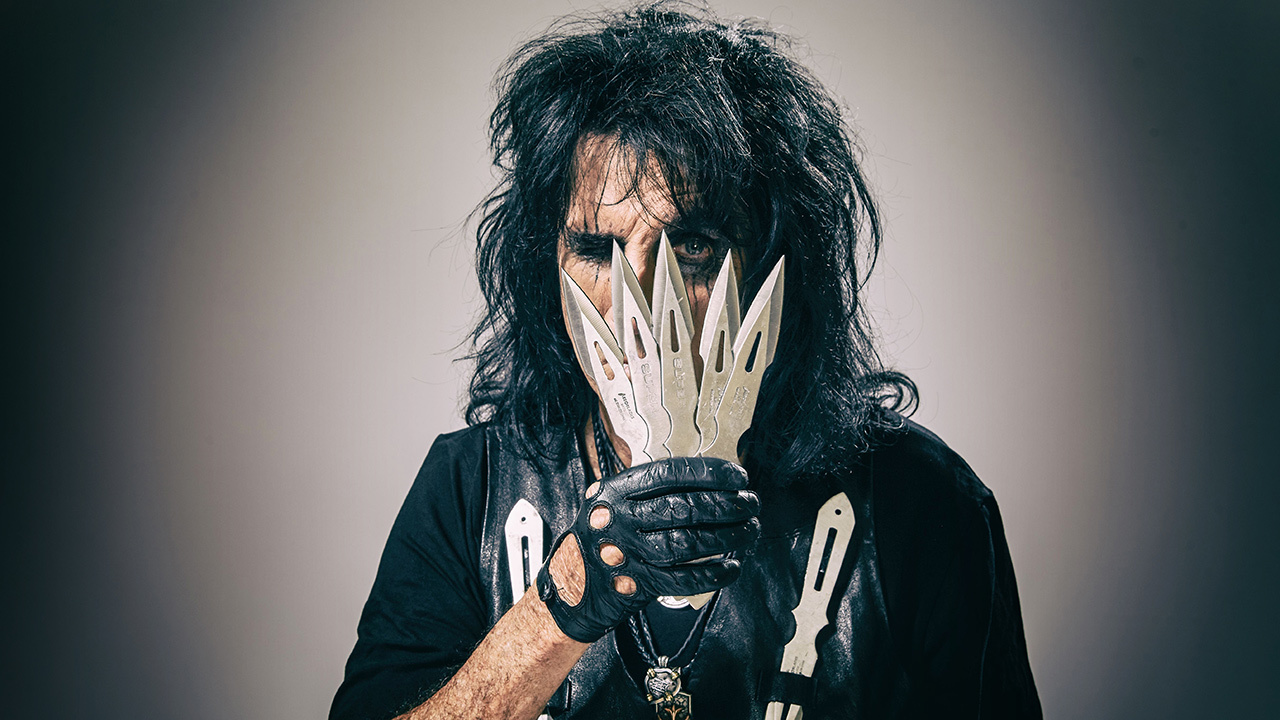Alice Cooper has firm views on what constitutes rock’n’roll. “Rock bands should scare you,” he declares. “They should be arrogant, snotty and have real swagger. There’s some good hard rock bands right now – Foo Fighters, The Struts, Royal Blood – but I can’t believe how many anaemic ones there are. What’s happened to the testosterone in rock’n’roll? The world needs hard rock with attitude, bands who get up there and kill it every night.”
You could hardly accuse Alice of being anaemic. Or, for that matter, holding back on stage. He’s spent most of the past fifty years as the undisputed cock of shock rock, the high priest of Grand Guignol, a man who tore up rock’n’roll, limb by bloody limb, and created high theatre from sex, death and gore. And, more than 50 million album sales later, he’s still at it.
Now aged 69, today wearing black leathers and fashionably ripped jeans, a whip-thin Alice looks healthy as he holds court in a swish hotel in central London. He’s here to promote Paranormal, the 27th studio album of his career and the first since 2011’s Welcome 2 My Nightmare. It’s a record that finds him doing what he does best: meting out a series of twisted tales over brutal riff-rock and climbing choruses. It’s loud, macabre and funny in all the right places. There are badass songs about rats, phantoms, cross-dressers, Angels of Death and Victoria’s Secret models, and a whole lot more besides. In short: classic Alice.
“Alice Cooper will always be hard rock,” he states, reinforcing his modus operandi. “I’ll never move away from that. It will always be a guitar-driven rock’n’roll album and I’ll surround myself with the best players. That way it’s a protection for me. I can write the lyrics and go all over the place, but I know that the band is top-of-the-line. That’s the smart thing you have to do.”
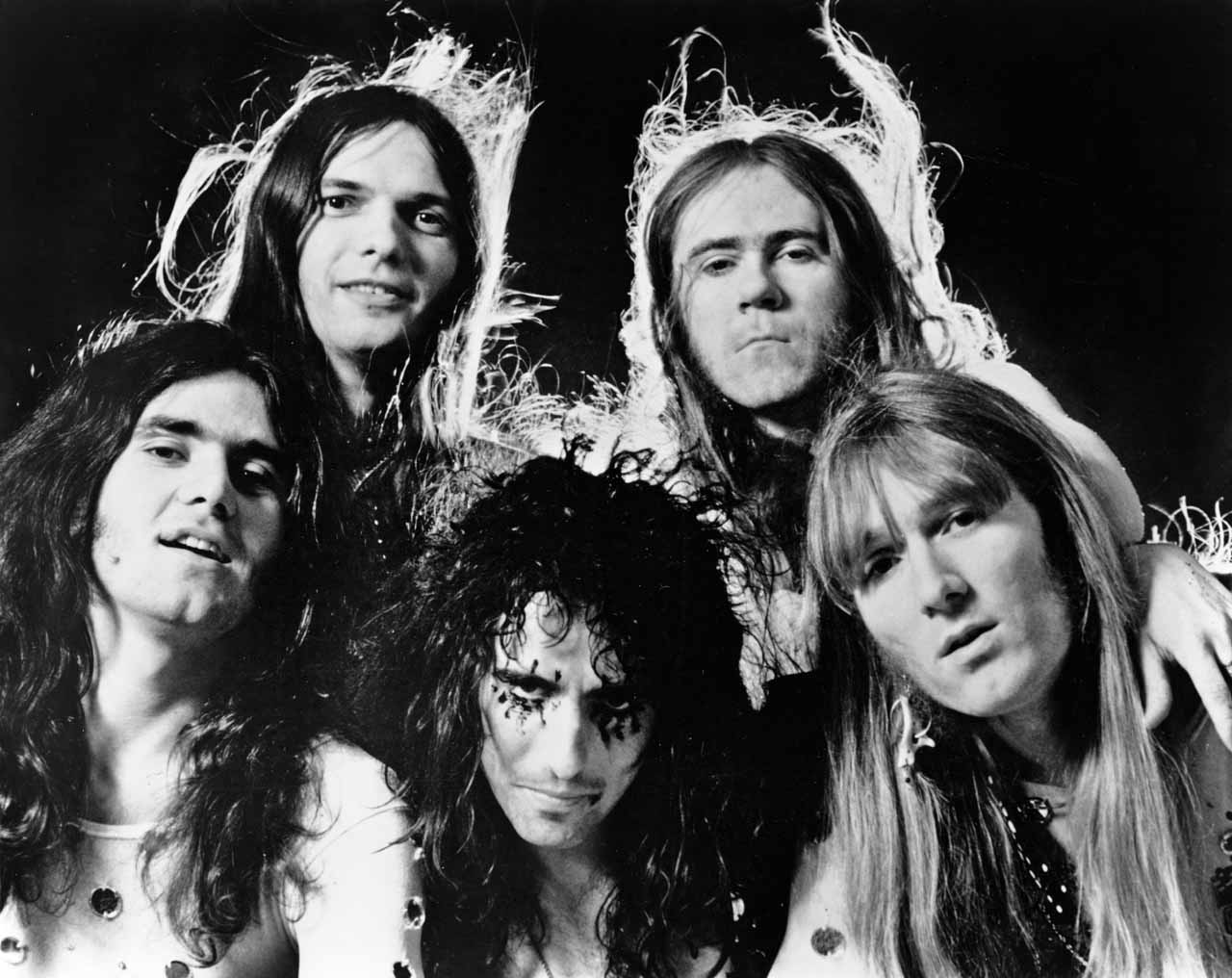
True to his word, Paranormal is crawling with talent. As well as guitarists Tommy Henriksen and Tommy Denander, Cooper has also retained ace producer Bob Ezrin from Welcome 2 My Nightmare. He and Ezrin go way back, of course, having first worked together on 1971’s Love It To Death, the album that broke the Alice Cooper band at home in the US and abroad. Several top-drawer guest musicians make cameos: ZZ Top guitarist Billy Gibbons, Deep Purple bassist Roger Glover and U2 drummer Larry Mullen Jr.
It’s a choice of personnel that, besides Ezrin, sometimes circles back to Alice’s 70s prime. He and Gibbons, for example, have shared history. “We took ZZ Top out on their first tour,” Alice recalls. “I’ve always loved Billy’s guitar playing. It’s a very specific, blues-driven kind of thing. When we wrote Fallen In Love for the new album, it was suddenly a Texas roadhouse song. I looked at Bob and went: ‘Billy Gibbons.’ He went: ‘Oh yeah.’ We called him up, sent him the song and he goes: ‘I got the flu right now, but this song makes me feel better.’ He just nailed it. It couldn’t have been anybody else but Billy.”
For all its slickness and modernity, however, the most intriguing aspect of Paranormal is that it plugs further into Alice’s past. Original bandmates Michael Bruce (guitar), Dennis Dunaway (bass) and Neal Smith (drums), with whom Alice reunited for several tracks on Welcome 2 My Nightmare, are on board for this one too. As well as co-writing a number of the new songs, the entire band stomp their way through Genuine American Girl and You And All Your Friends, leaving the distinct footprint of the group that recorded such 70s-defining classics as I’m Eighteen, School’s Out, Elected and No More Mr. Nice Guy.
“When we started planning this album, I’d said to Bob: ‘Let’s write twenty songs, and the best thirteen get on the album,’” Alice explains. “A lot of people gave us their ideas, and I wanted to include Neal, Dennis and Mike [Alice Cooper band co-founder and lead guitarist Glen Buxton passed away in 1997]. The great thing about the original band was that when we broke up we did it without any bad blood. We’d been through a lot together – from being hated, loved, poor, rich – but we got to a point where we were creatively bankrupt after Muscle Of Love [1973]. We were just tired and drifted away from each other. Throughout the years I stayed in touch with them. We were never enemies.
“I told Neal I was writing songs for this new album and he said: ‘I’ve got a couple of things. And Mike’s in town.’ So I told him to bring Mike over too, and we wrote probably ten songs. Dennis sent a couple in as well.
“It was always a good experience with those guys,” he continues. “Dennis is one of the oddest songwriters and most prolific bass players there is. Neal doesn’t play like anybody else – Bob Ezrin once said that he plays drums like an octopus falling out of a tree. Neal would find out how many drums Keith Moon had and get one more. Then call him and tell him [laughs]. Mike Bruce was the king of the riff. He’d come up with these very simple riff songs that were so hard to get away from – No More Mr. Nice Guy, Be My Lover. And they’re the most powerful ones, the songs that hit you between the eyes.”
- Alice Cooper - Paranormal album review
- The TeamRock+ Singles Club
- TeamRock Radio app back on Apple’s app store
- Every Alice Cooper Album, Ranked From Worst to Best
Perhaps the most striking track on Paranormal is The Sound Of A. A moody, trippy, slightly sinister meditation, it seems to sit apart from the others, as if suspended in time. It turns out there’s a pretty good reason for this. And a great backstory.
“Dennis brought in [end-of-days rocker] Fireball and You And All Your Friends, then he said: ‘I want you to listen to this,’” Alice says. “And he played me the tape of The Sound Of A. I went: ‘Wow! I remember you wrote that, Dennis.’ And he goes: ‘It was 1967, and I didn’t write it, you did. It was the first song you ever wrote by yourself.’
“When we played the Cheetah Club in Santa Monica with Pink Floyd [November 1967, on Floyd’s first US tour], they stayed at our house for two days. I was probably smoking grass for the first or second time, took my guitar into the other room, wrote this song, put it on tape and forgot all about it. It’s the craziest thing. Bob heard it and loved it. It’s totally unique to anything else on the album.”
Speaking to Classic Rock a few days later, Dunaway helps flesh out the details.
“Alice wrote three songs that weekend,” he remembers. “Laughing At Me and Shoe Salesman both ended up on Easy Action [1970]. Then there was The Sound Of A. It came with a whole concept. I still have two or three pages of Alice’s elaborate notes about this futuristic world that the song was originally supposed to represent. But then [1969 debut] Pretties For You went in a whole different direction, and The Sound Of A fell by the wayside, like many of our songs. I’d always liked it, though and at least a decade later I decided to make a demo of it. I couldn’t remember it exactly, so I filled in the blanks. The chords are generally the ones that Alice wrote. Now, after all these years, it’s finally surfaced in such a grand way.”
When he first wrote the song, Alice and the band were still gigging as The Nazz, taking their name from The Yardbirds song The Nazz Is Blue. Having moved to Los Angeles from Phoenix, Arizona, they’d secured a residency at the Cheetah, but were still nearly a year away from being ‘discovered’ by their first label boss, Frank Zappa.
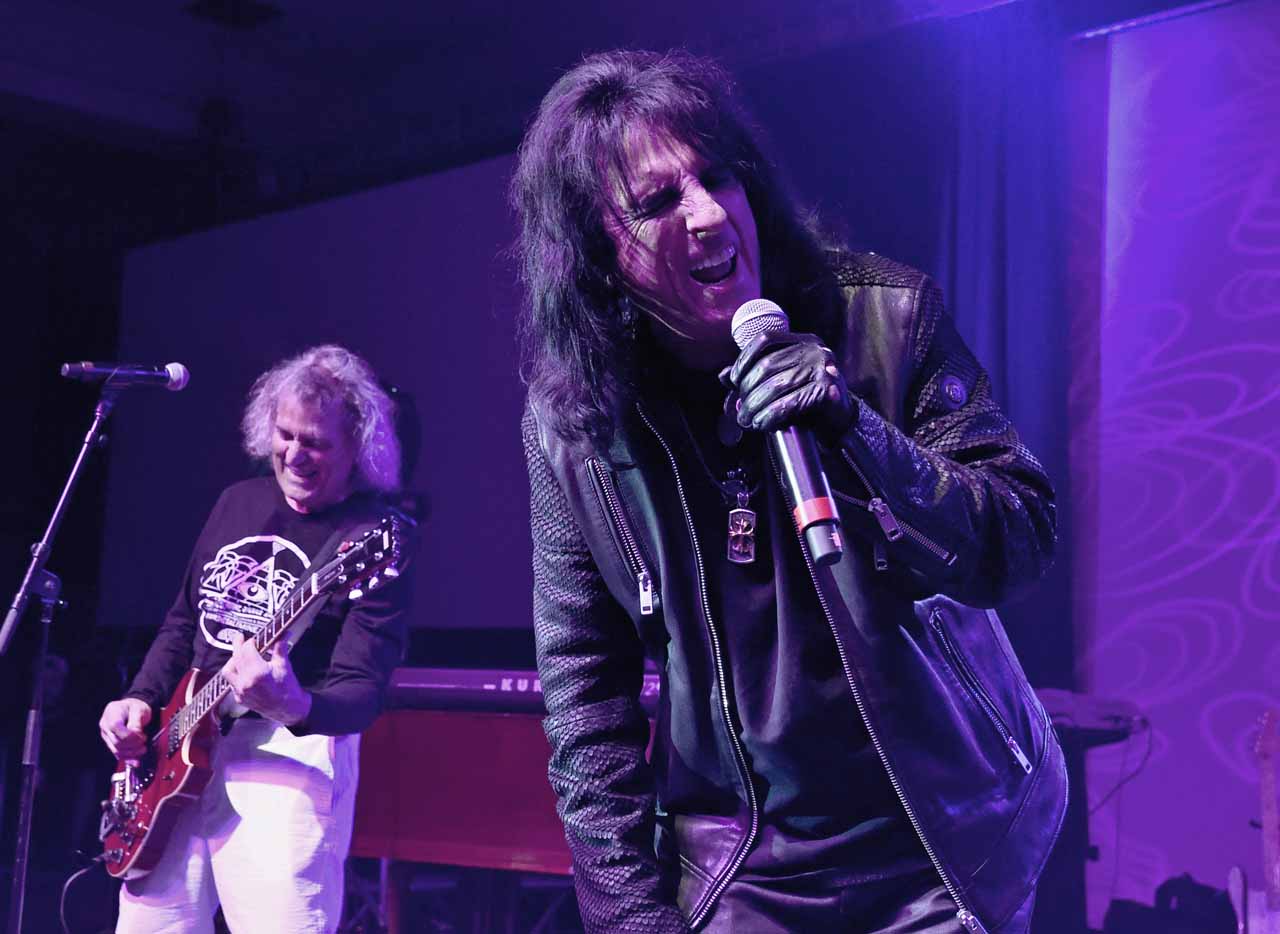
Alice still has a vivid recollection of the Floyd as house guests. “We played with them at the Cheetah and they were doing stuff from The Piper At The Gates Of Dawn,” he recalls. “I still don’t know how Syd Barrett could be that high. I got up one morning and Syd is sitting in the kitchen with a box of cornflakes in front of him. He’s going like this [laughing and pointing]. Apparently the cornflakes were dancing and singing. I went: ‘How you doing, Syd?’ And he goes: ‘Shh!’ He was busy watching these cornflakes in the same way that I would watch cartoons on TV.
“We had an audition that afternoon at [Hollywood nightclub] Gazzarri’s, and asked the Floyd if they wanted to go along. ‘Yeah, we’ll come down and support you in the audience. Oh, and we made these brownies.’ We ate these brownies before the gig, and the world went sideways. Sunset Strip was suddenly on a forty-five-degree angle. I fell off the stage three times, and the Floyd guys were laughing their heads off because they were so buzzed. I never did acid, not once. But they might have put some pretty good cannabis or hash in those brownies. We were beer drinkers, that was really our thing. We were never into heavy drugs at all, whereas they were more psychedelic than we were. Anyway, we got the job at Gazzarri’s.”
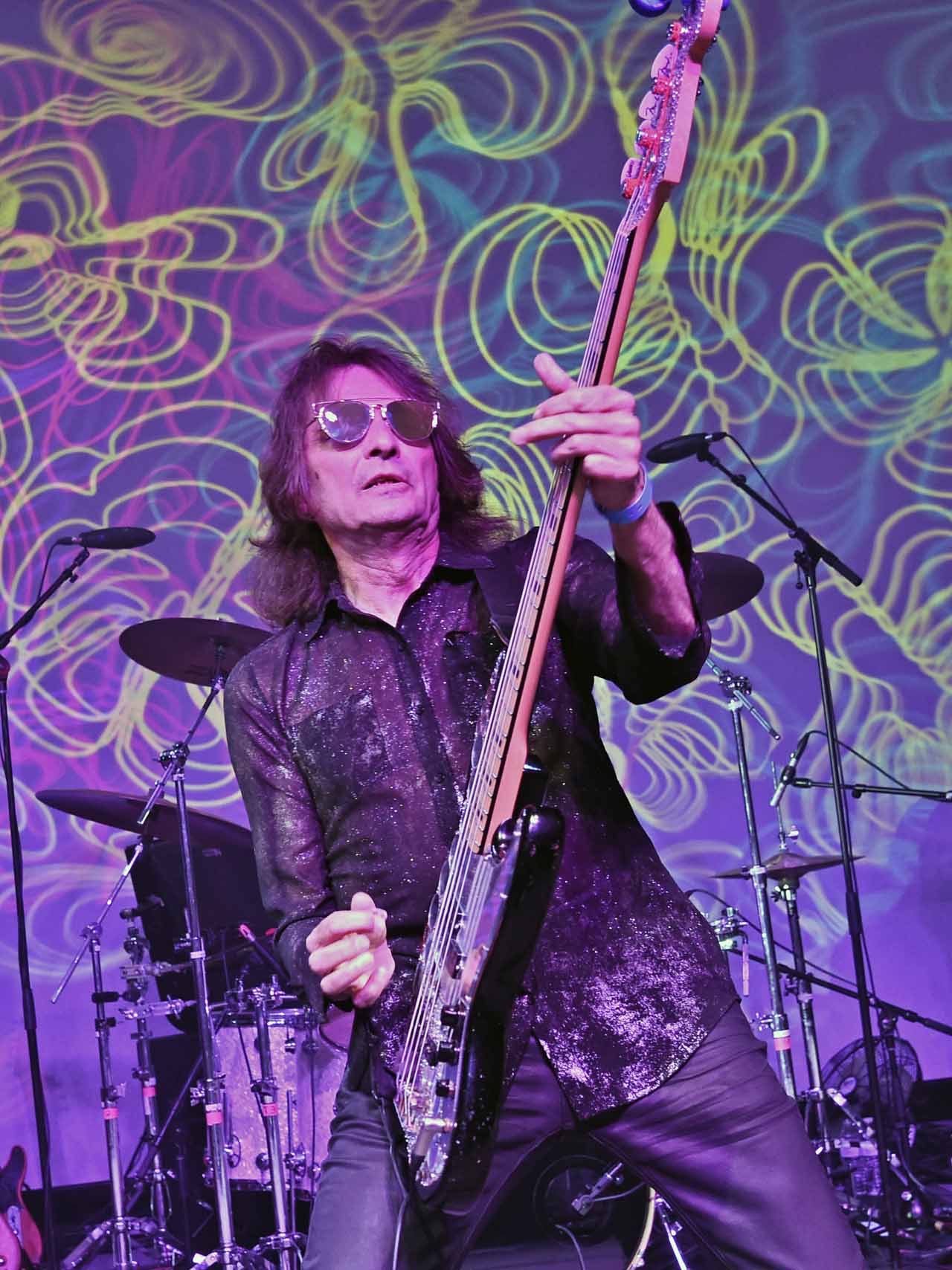
It transpires that the two tracks on Paranormal that feature the founder members in full rocking order – Genuine American Girl and You And All Your Friends – also have deep roots.
“Dennis and I had a band in New England in the late seventies called the Flying Tigers,” Neal Smith explains. “And one of the things we played was a composition I wrote called Red Blooded American Girl. When I was searching for songs for Alice and Bob for the new album, I chose that one. They thought it had potential. The song was totally torn apart and rewritten as Genuine American Girl, in the true gender-bending spirit of the original Alice Cooper group.”
“Then, in the early eighties, Dennis and I were writing songs together,” Dunaway adds. “And he played me a great one called In The Films Of Me And My Friends. I loved it, we worked out an arrangement and I added some smokin’ drums. When we played it for Alice and Bob earlier this year, they wanted to do an updated version but also keep the fire and excitement of the original.”
Despite all the missing decades, it’s remarkable to hear how singular Alice and the old band still sound when they get into a room together. The four of them lock into an intense rock’n’roll groove that has lost little of its venom since their platinum-selling heyday.
“Back then, Neal wasn’t so much holding the beat down as he was a lead drummer,” says Michael Bruce, attempting to nail the secret of their chemistry. “Dennis went all over the place with his basslines, Glen was the lead guitar player and I guess I held the fort down by playing these powerful rhythms. So when we were in the studio for Paranormal, it felt like we were brothers with a lot of past history. You might not see your family all the time, but when you get together, it’s special.”
This mini-reunion has now been extended to Alice’s live shows. In addition to his regular band, his British tour this November will also incorporate Bruce, Dunaway and Smith. Alice isn’t giving too much away just yet, but it promises to be spectacular.
“At the end of the show [spoiler alert!] with my touring band, which is probably the best band I’ve ever worked with, Alice kills the girl, they put him in a guillotine and cut his head off,” Alice says. “The curtain comes down, then it goes back up again and suddenly it’s the original band. That’s like the icing on the cake. When those guys play, it’s darker, heavier, slower and more powerful than the touring band. They’re dangerous. And I sing differently with them.”
It’s instructive to note that the original band will be joining Alice only on the UK dates of his world tour. And there’s a simple reason for this: “The British fans are our oldest and most loyal fans,” Alice says. “Britain totally understood our sense of humour from the start, even when we’d do publicity stunts that were totally outrageous. Like when we took a lorry and a great big poster of Alice, totally naked with a big python coming out of his crotch, and installed it in Piccadilly Square [Circus] on a Friday, to make sure it stopped all the traffic. Most places would be irate, but the British public loved the fact that we would go to that much trouble [laughs]. The British people are what really launched Alice Cooper. They got it long before Americans did, so we owe them this.”
Alice, Bruce, Buxton, Dunaway and Smith (and pet boa constrictor) first brought their live show to the UK when they came to London in November 1971, to coincide with the release of their fourth album, Killer. It was a brief introduction that involved a memorable appearance on BBC TV’s The Old Grey Whistle Test and a headline show at the Rainbow in Finsbury Park.
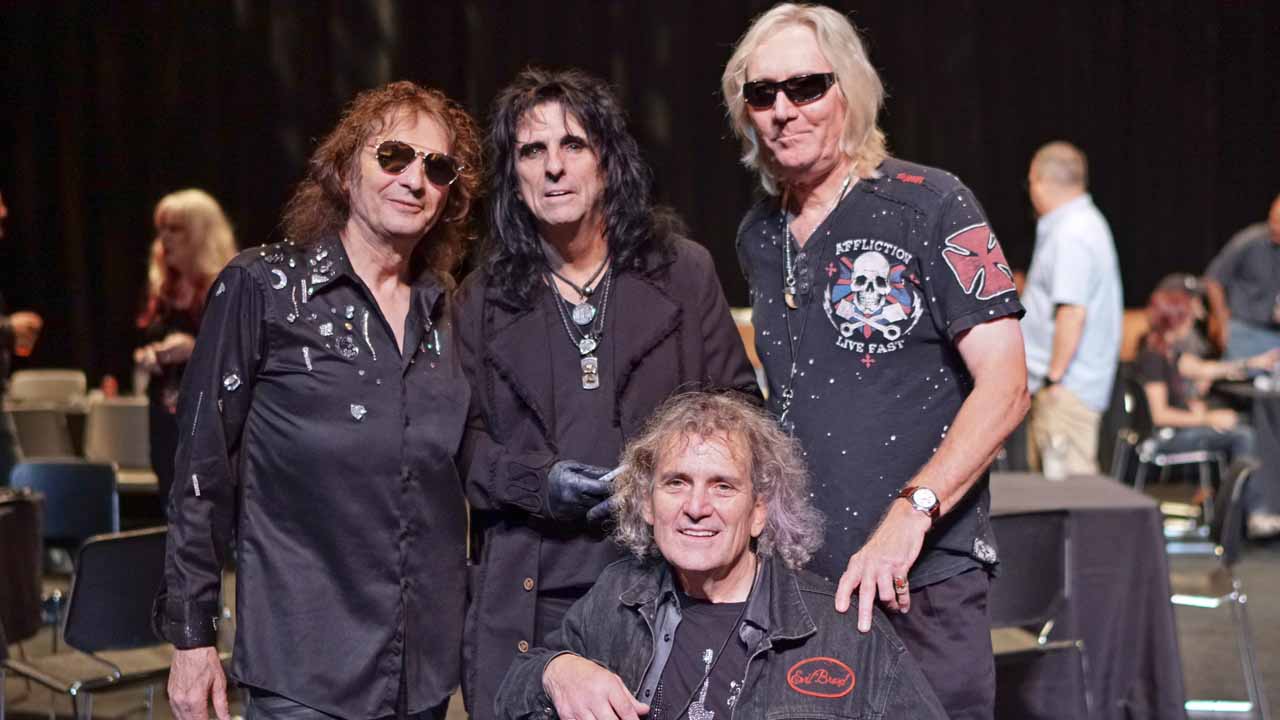
“The British Invasion was the biggest influence on the Alice Cooper group,” says Dunaway. “So by the time we finally went over there, we were ready to soak it all up. I once saw an interview with [Spiders From Mars bassist] Trevor Bolder, who said that David [Bowie] made the Spiders go to our Rainbow show. They’d fancied themselves as tough blues guys in Levi jeans, but David took them along specifically to prove that they could glam out and still look tough.”
Meanwhile, Alice’s abiding recollection of that trip serves as a morbid premonition of the gallows-humour havoc that he and the band would soon wreak on stage.
“It was the weirdest thing that ever happened to me,” he says, shaking his head at the memory. “I was sitting next to a very old woman on the flight over. We were playing cards and she said [whispering]: ‘I take opiate pills.’ She was about ninety. I said: ‘Well, that’s cool. I drink beer.’ Then she goes: ‘Don’t wake me up if they bring food, because I really gotta sleep.’ So she fell asleep. But never woke up. I got off the plane and they wheeled her body off on a trolley. The person next to me dies on the plane, and that’s the very first the British press ever hears about me! If I’d thought about it, I should’ve taken a sharpie and drawn two little circles on the side of her throat, to look like little holes. She would’ve thought that was funny.”
Forty-six years on, Alice Cooper is still the mythical vampire of rock’n’roll, a bloodied collision of menace and high camp, a lurid flood of colour in an all too anaemic rock world. And he’s in absolutely no doubt as to what makes it continue to work.
“When you hit that stage, you need to be as egotistical as you possibly can,” he says. “You’re a rock star – you own it. When I hit the stage as Alice, I want him to be the most arrogant bastard up there. Because that’s what the audience wants him to be.”
Paranormal is out now. More at: alicecooper.com, nealsmithrocks.com and dennisdunaway.com
Alice Cooper reunites original band for UK tour
Alice Cooper: "Trust me, rockstars are dumber than anyone else out there"
